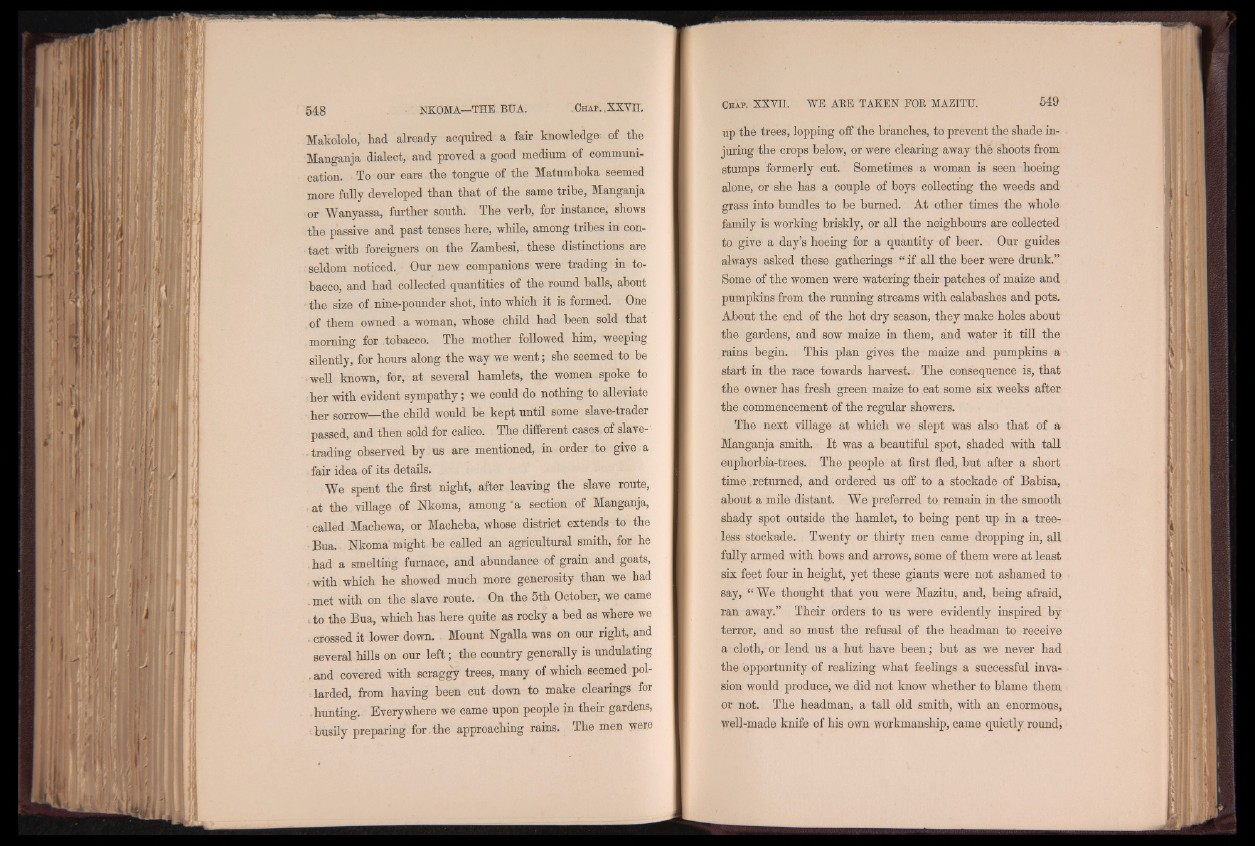
Makololo, had already acquired a fair knowledge: of the
Manganja dialect, and proved a good medium of communication.
To our ears the tongue of the Matumboka seemed
more fully developed than that of the same tribe, Manganja
or Wanyassa, further south. The verb, for instance, shows
the passive and past tenses here, while, among tribes in contact
with foreigners on the Zambesi, these distinctions are
seldom noticed. Our new companions were trading in tobacco,
and had collected quantities of the round halls, about
the size of nine-pounder shot, into which it is formed. One
of them owned a woman, whose child had been sold that
morning for tobacco. The mother followed him, weeping
silently, for hours along the way we went; she seemed to be
• well known, for, at several hamlets, the women spoke to
her with evident sympathy; we could do nothing to alleviate
her sorrow—the child would he kept until some slave-trader
passed, and then sold for calico. The different cases of slave-'
- trading observed by us are mentioned, in order to give a
fair idea of its details.
We spent the first night, after leaving the slave route,
at the village of Nkoma, among "a section of Manganja,
called Machewa, or Maeheba, whose district extends to the
Bua. Nkoma might, be called an agricultural smith, for he
. had a smelting furnace, and abundance of grain and goats,
with which he showed much more generosity than we had
.met with on the slave route. On the 5th October, we came
.to the Bua, which has here quite as rocky a bed as where we
. crossed it lower down. Mount Ngalla was on our right, and
several hills on our le ft; the country generally is undulating
. and covered with scraggy trees, many of which seemed pollarded,
from having been cut down to make clearings for
hunting. Everywhere we came upon people in their gardens,
busily preparing for.the approaching rains. The men were
up the trees, lopping off the branches, to prevent the shade injuring
the crops below, or were clearing away thé shoots from
stumps formerly cut. Sometimes a woman is seen hoeing
alone, or she has a couple of boys collecting the weeds and
grass into bundles to be burned. At other times the whole
family is working briskly, or all the neighbours are collected
to give a day’s hoeing for a quantity of beer. Our guides
always asked these gatherings “ if all the beer were drunk.”
Some of the women were watering their patches of maize and
pumpkins from the running streams with calabashes and pots.
About the end of the hot dry season, they make holes about
the gardens, and sow maize in them, and water it till the
rains begin. This plan gives the maize and pumpkins a
start in the race towards harvest. The consequence is, that
the owner has fresh green maize to eat some six weeks after
the commencement of the regular showers.
The next village at which we slept was also that of a
Manganja smith. It was a beautiful spot, shaded with tall
euphorbia-trees. The people at first fled, but after a short
time .retamed, and ordered us off to a stockade of Babisa,
about a mile distant. We preferred to remain in the smooth
shady spot outside the hamlet, to being pent up in a treeless
stockade. Twenty or thirty men came dropping in, all
fully armed with bows and arrows, some of them were at least
six feet four in height, yet these giants were not ashamed to
say, “ We thought that you were Mazitu, and, being afraid,
ran away.” Their orders to us were evidently inspired by
terror, and so must the refusal of the headman to receive
a cloth, or lend us a hut have been; but as we never had
the opportunity of realizing what feelings a successful invasion
would produce, we did not know whether to blame them
or not. The headman, a tall old smith, with an enormous,
well-made knife of his own workmanship, came quietly round,